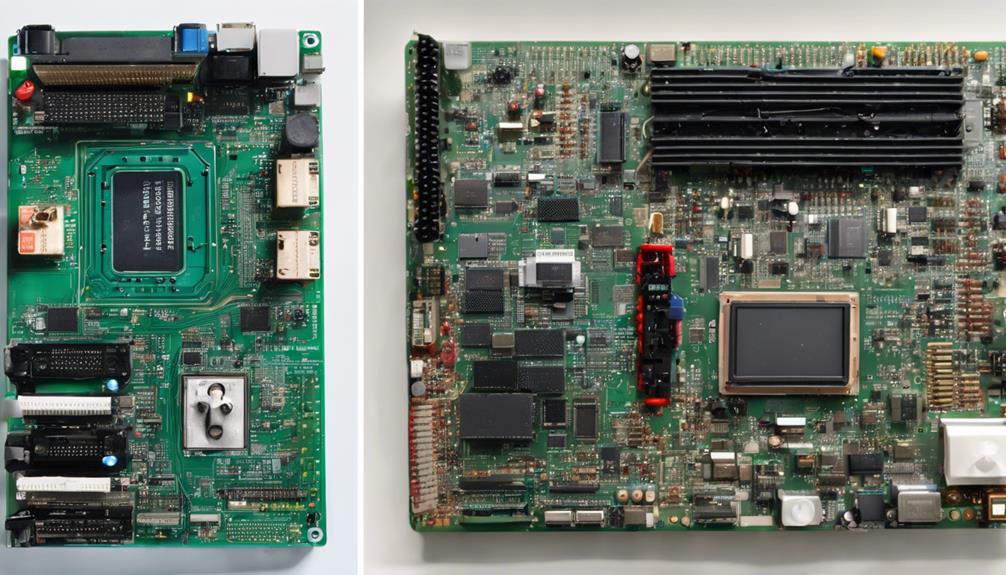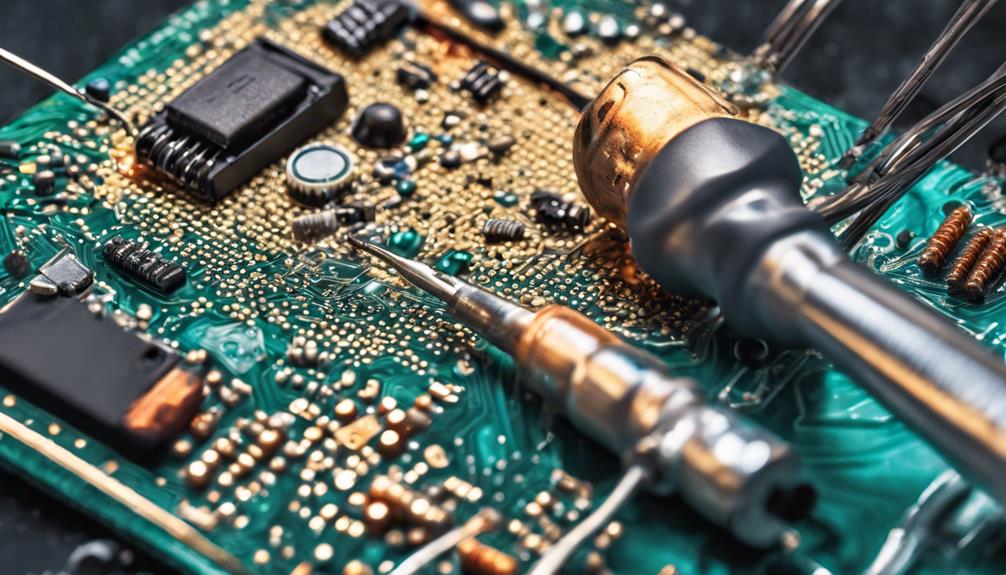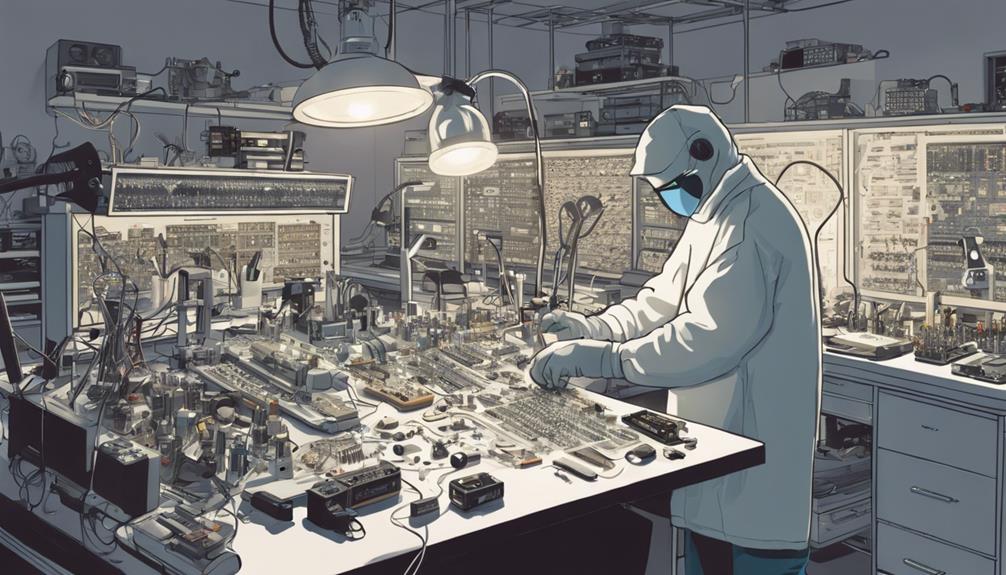Through-hole technology plays a vital role in a wide range of applications across various industries, including automotive electronics, where it guarantees durability and mechanical stability in critical systems. In industrial control systems, it provides secure connections and long-lasting performance. Medical devices rely on through-hole technology for compact and mechanically stable designs. Additionally, it is used in high-power electronics, PCB prototyping, legacy system component replacement, and harsh environment electronic devices. Its applications also extend to high-frequency circuits, aerospace, and defense electronics. Its versatility and reliability make it an essential component in various sectors, and exploring its applications further reveals its significance in enabling innovative solutions.
Key Takeaways
- Through-hole technology is preferred in automotive electronics for its durability and mechanical stability in critical systems like engine control units and ABS modules.
- Industrial control systems rely on through-hole technology for secure connections, long-lasting performance, and ease of maintenance in rugged environments.
- In medical device component assembly, through-hole technology enables compact, mechanically stable devices with long-lasting performance and easy maintenance.
- Through-hole technology is essential for high-power electronics solutions, including high-power amplifiers and thermal management, due to its ability to handle high current flow and efficient heat dissipation.
- The technology is also used in PCB prototyping and fabrication, legacy system component replacement, harsh environment electronic devices, and high-frequency circuit components.
Automotive Electronics Applications
In the demanding environments of modern vehicles, through-hole technology has emerged as a preferred solution for automotive electronics applications, where its inherent durability and mechanical stability are essential for ensuring reliable performance and safety.
Through-hole components are widely used in automotive electronics, including engine control units, ABS modules, and dashboard electronics, where they provide reliable connections for critical safety and performance functions.
The robust nature of through-hole technology makes it ideal for withstanding the high current requirements, vibration resistance, and temperature variations inherent in vehicle operation. Automotive manufacturers rely on through-hole technology for long-term reliability and serviceability in electronic systems, ensuring that critical safety functions remain operational even in extreme conditions.
Industrial Control System Components
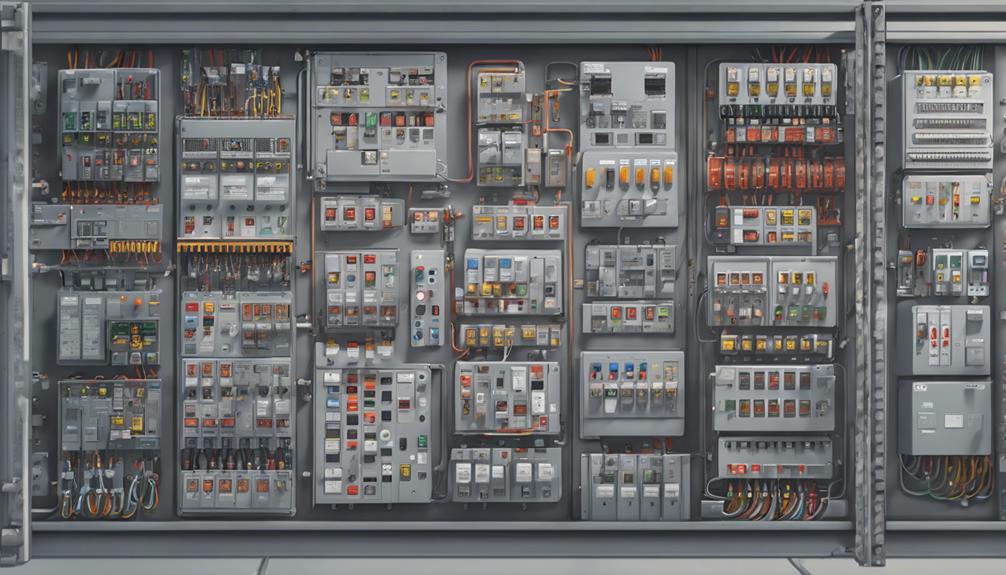
Because industrial control systems demand unwavering reliability and durability, through-hole technology has become a staple in components requiring secure connections and long-lasting performance. Through-hole components are ideal for industrial control systems, as they provide robust mechanical connections and ease of soldering. This technology is particularly suited for power electronics in industrial control systems, guaranteeing stable and long-lasting performance. Components such as resistors, capacitors, and connectors often utilize through-hole technology to secure connections.
The ruggedness and serviceability requirements of industrial applications make through-hole technology a preferred choice. The durable connections and ease of maintenance provided by through-hole components make them an essential component in industrial control systems.
Medical Device Component Assembly

In medical device component assembly, the significance of through-hole technology lies in its ability to provide reliable connection solutions, ensuring the integrity of critical medical devices.
As device miniaturization efforts continue to advance, the role of through-hole technology becomes increasingly essential in enabling the development of compact yet robust medical devices.
Device Miniaturization Efforts
Through-hole technology plays a pivotal role in device miniaturization efforts for medical device component assembly, as it enables the creation of compact, reliable, and mechanically stable devices that meet the stringent requirements of medical electronics.
This technology supports the development of smaller, yet highly functional medical devices, such as pacemakers, implantable sensors, and diagnostic equipment, that require durable connections and compact designs.
By utilizing through-hole technology, medical device manufacturers can guarantee the reliability and serviceability of their products, which is critical in applications where safety and functionality are paramount.
The mechanical stability and reliability of through-hole components make them ideal for medical devices that demand long-lasting performance.
Additionally, through-hole technology facilitates the creation of devices that can be easily serviced and maintained, reducing downtime and ensuring continuous operation.
Reliable Connection Solutions
Reliable connections are paramount in medical device component assembly, as they directly impact the performance and safety of critical applications. Through-hole technology plays a crucial role in ensuring durable connections, which are essential for medical device assembly. The technology provides mechanical stability, precision, and serviceability, making it an important choice for medical electronics.
In medical device assembly, through-hole technology offers several benefits, including:
- Robust connections: Through-hole assembly guarantees reliable connections that can withstand the rigors of medical equipment use.
- Durability: Through-hole technology provides sturdy connections that can withstand the demands of medical device operation.
- High-reliability requirements: Through-hole technology meets the high-reliability standards of medical equipment, ensuring excellent performance and safety.
Through-hole technology is essential in medical device assembly, as it provides reliable connections that meet the high-reliability standards of medical equipment. By leveraging through-hole technology, medical device manufacturers can guarantee the precision, durability, and serviceability of their devices, ultimately enhancing patient care and safety.
High-Power Electronics Solutions
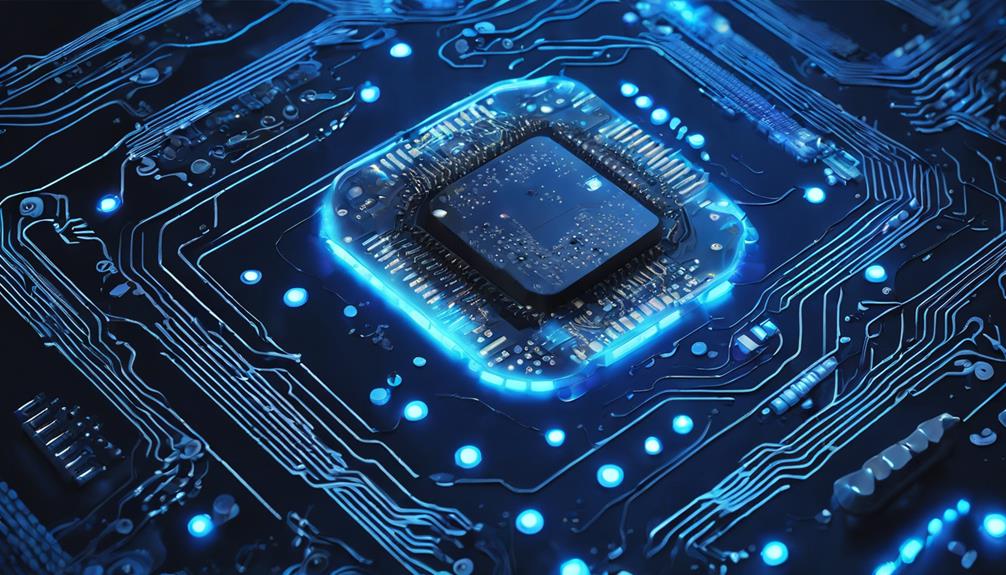
In high-power electronics solutions, through-hole technology plays a vital role in ensuring reliable and efficient performance. High-power amplifiers benefit from the robust connections and thermal management capabilities that through-hole components provide.
High-Power Amplifiers
In demanding high-power electronics applications, robust connections capable of handling high current flow are essential, making through-hole technology a preferred choice for high-power amplifiers. This preference stems from the technology's ability to provide mechanical stability and durability, guaranteeing reliable performance in harsh operating environments.
Through-hole components in high-power amplifiers offer several key benefits, including:
- Efficient power management: Through-hole technology enables efficient power management and signal processing, making it an ideal choice for high-power amplifiers in aerospace, military, and industrial equipment.
- Ruggedness and reliability: Through-hole components ensure long-term reliability and ruggedness in harsh operating environments, withstanding high voltages and currents without compromising performance.
- Robust connections: Through-hole technology provides robust connections capable of handling high current flow, making it an essential component in high-power amplifiers.
Thermal Management
As high-power electronics operate at increasingly higher temperatures, the need for effective thermal management becomes essential, and through-hole technology plays a vital role in guaranteeing reliable operation of power components.
Thermal management is critical in high-power electronics applications, as excessive heat can lead to component failure and reduced lifespan. Through-hole technology provides an efficient solution for heat dissipation, enabling the reliable operation of power components.
Through-hole components, such as heatsinks, power transistors, and diodes, are specifically designed to manage thermal challenges in high-power electronics applications. These components are commonly used in power supplies, inverters, motor drives, and industrial control systems, where thermal management is paramount.
Through-hole technology is preferred for high-power electronics due to its robustness and heat dissipation capabilities, making it an ideal solution for thermal management in high-power electronics applications. By leveraging through-hole technology, designers can ensure reliable and efficient thermal management, resulting in improved system performance and longevity.
PCB Prototyping and Fabrication
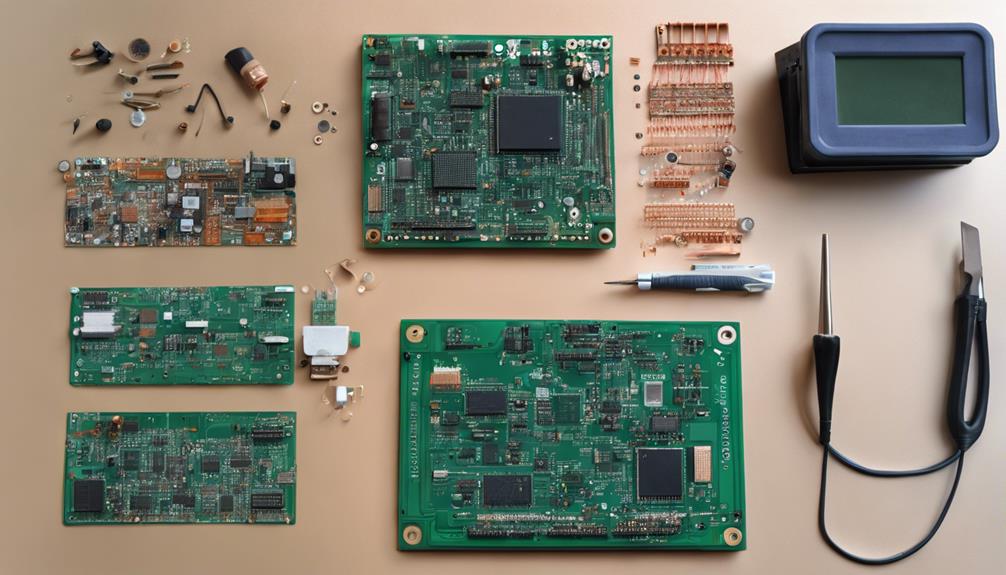
During the initial stages of electronic system development, through-hole technology proves instrumental in facilitating rapid PCB prototyping and fabrication. This technology offers several advantages, including ease of use, cost-effectiveness, and flexibility in component selection and layout adjustments.
The benefits of through-hole technology in PCB prototyping and fabrication can be summarized as follows:
- Rapid prototyping: Through-hole technology enables quick testing, modifications, and component replacements, allowing designers to iterate designs and verify performance efficiently.
- Flexibility in design: Through-hole components can be easily swapped or replaced, enabling designers to test different circuit designs and soldering techniques.
- Efficient testing and development: Through-hole technology facilitates rapid PCB fabrication for prototypes, enabling designers to test, refine, and finalize product specifications effectively.
Legacy System Component Replacement
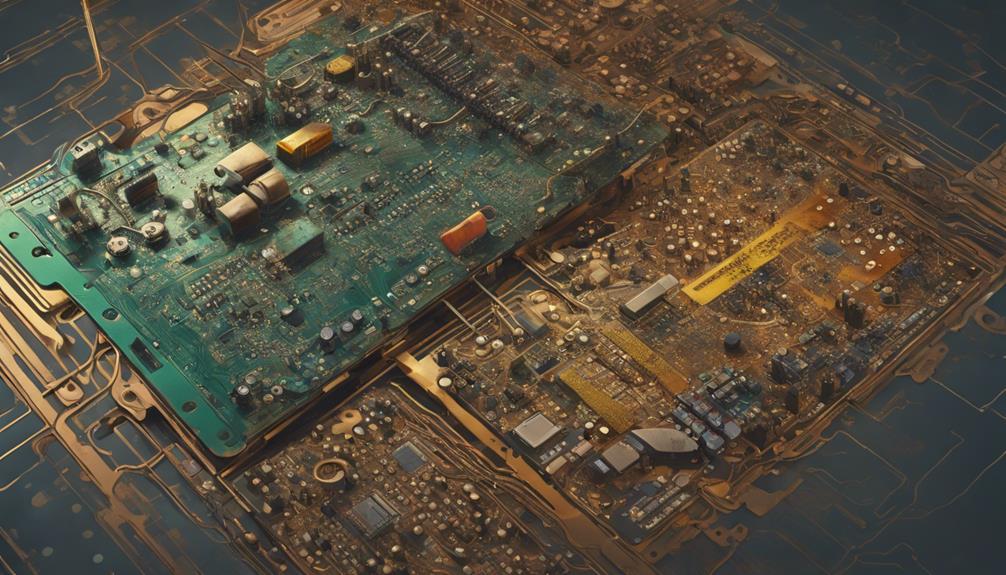
Through-hole technology frequently proves crucial in legacy system component replacement, offering a reliable solution for repairing or replacing components in outdated equipment that still require functionality.
This technology provides an ideal solution for maintaining and repairing older electronic systems, guaranteeing continued operation and minimizing downtime. Through-hole components are readily available for legacy designs and can be easily integrated into existing circuit boards, making them an attractive option for component replacement.
The durability and ease of repair offered by through-hole technology make it an essential tool for legacy system maintenance. Additionally, through-hole technology ensures compatibility and reliability when replacing components in older electronic systems, reducing the risk of system failure and ensuring continued operation.
Harsh Environment Electronic Devices
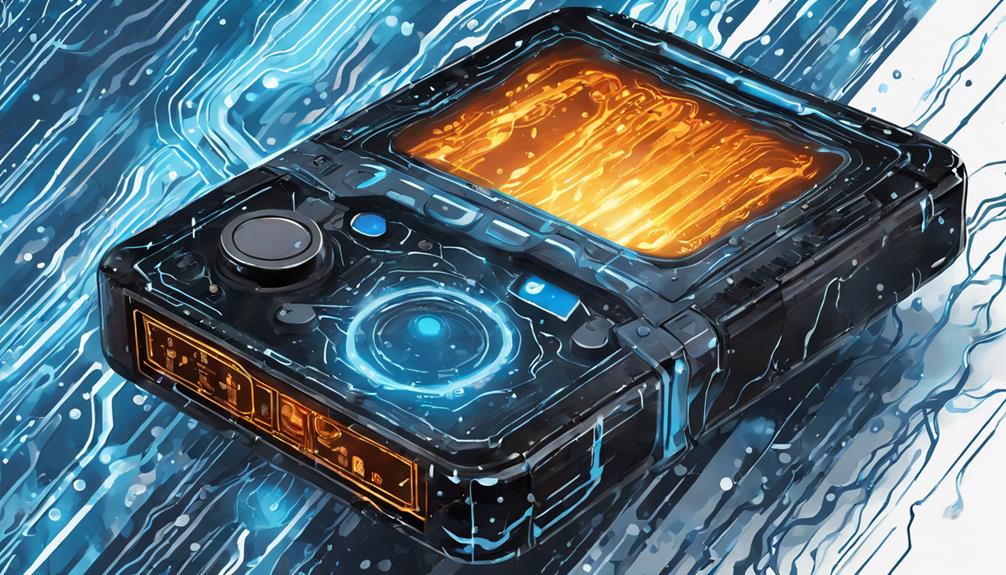
In harsh environment electronic devices, where reliability is paramount, through-hole technology emerges as a preferred choice due to its exceptional durability and robust mechanical connections. This technology is particularly suited for applications in aerospace, military equipment, and industrial control systems, where extreme temperatures, vibrations, and moisture can compromise performance.
Through-hole components offer high resistance to environmental factors, ensuring stable operation in challenging settings. The mechanical strength of through-hole technology makes it suitable for electronic devices exposed to rugged conditions in various industries.
Key benefits of through-hole technology in harsh environments include:
- Enhanced durability: Through-hole components can withstand extreme temperatures, vibrations, and moisture, ensuring long-term performance.
- Robust mechanical connections: Through-hole technology provides reliable mechanical connections, reducing the risk of component failure in harsh environments.
- High reliability: Through-hole components are designed to operate consistently in rugged conditions, ensuring stable performance in demanding applications.
High-Frequency Circuit Components
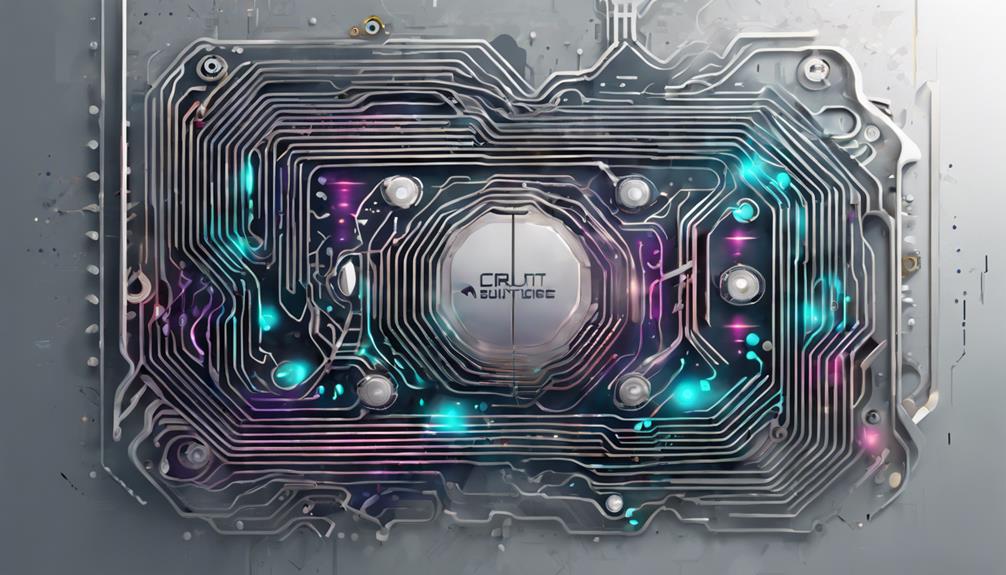
Critical signal integrity in high-frequency applications, such as RF circuits and filters, is guaranteed by the use of through-hole components, which provide the necessary mechanical robustness and durability for stable operation.
Through-hole technology is particularly suitable for high-frequency applications, where signal integrity is paramount. Components like inductors, capacitors, and resistors in through-hole format are used in high-frequency circuits to maintain stability and performance.
The strong electrical connections and resistance to signal interference provided by through-hole components make them an ideal choice for high-frequency circuitry. Aerospace, telecommunications, and RF equipment often utilize through-hole technology for high-frequency circuitry due to its reliability and performance capabilities.
Through-hole technology provides the necessary mechanical robustness and durability for high-frequency circuit operation, ensuring reliable performance in demanding applications. By leveraging through-hole technology, designers can create high-frequency circuits that meet the stringent requirements of modern RF systems.
How Can Through-Hole Technology be Applied in Different Industries and Products?
Through-hole technology is widely used in various industries and products, from automotive to aerospace. The best soldering techniques revealed can ensure strong and reliable connections for components in electronic devices. This method is particularly beneficial for applications requiring durability and reliability, making it a popular choice in many sectors.
Aerospace and Defense Electronics

Because aerospace and defense electronics operate in harsh environments characterized by extreme temperatures, high vibrations, and intense radiation, the use of dependable components is vital to guarantee mission-critical systems function flawlessly. Through-hole technology has proven to be an ideal solution for these applications, offering mechanical stability and reliability in the most demanding conditions.
Some of the key applications of through-hole technology in aerospace and defense electronics include:
- Military communication systems: Through-hole components provide secure electrical connections in high-vibration and high-temperature environments, ensuring reliable communication in critical situations.
- Radar equipment and avionics: Through-hole technology's high durability and robustness make it an ideal choice for these systems, which require long-term performance and serviceability.
- Missile guidance systems: The reliability and mechanical stability of through-hole components are essential for the precise functioning of these systems, where failure is not an option.
Through-hole technology's ability to provide reliable and durable components has made it an essential component in aerospace and defense electronics, ensuring the success of mission-critical operations.
Frequently Asked Questions
Which of the Following Is a Common Application of Through-Hole Technology?
In terms of common applications, through-hole technology is frequently utilized in high-power systems, such as power supplies and motor control systems, where ruggedness and mechanical stability are paramount.
Additionally, it is employed in aerospace and military electronics, where reliability is crucial. These demanding environments necessitate the use of through-hole technology to guarantee top performance and durability.
What Are Through Holes Used For?
Through-holes are primarily used for component lead insertion and wire connections on printed circuit boards (PCBs). They enable reliable and secure mounting of electronic components, ensuring robustness and durability.
Additionally, through-holes facilitate easy component replacement and repair, reducing maintenance time and costs. This technology is particularly useful in high-reliability applications where component longevity and stability are essential.
What Are the Benefits of Through-Hole?
Like a fortress guarding against electronic failure, through-hole technology stands strong, offering a bastion of benefits.
Foremost, it provides unparalleled reliability, ensuring seamless operation in demanding environments.
The technology's robust connections and high power handling capabilities make it an ideal choice for critical systems.
In addition, through-hole technology facilitates effortless repair and maintenance, minimizing downtime and ensuring continuous functionality.
Where Is Through-Hole Packaging Used?
Through-hole packaging is utilized in diverse industries where reliability and durability are paramount. It is extensively employed in high-reliability applications, including aerospace, military equipment, and industrial control systems.
Additionally, it is prevalent in medical devices, telecommunications equipment, and automotive electronics, where its robustness and stability are leveraged to withstand harsh environments and high-vibration conditions.
